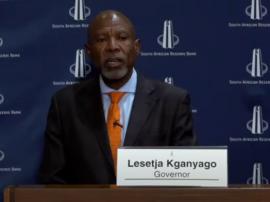
Reserve Bank Governor Lesetja Kganyago has announced that the repo rate will remain unchanged at 8.25%.
Kganyago made the announcement in Pretoria on Thursday after a meeting of the Monetary Policy Committee (MPC).
He said South Africa’s load shedding has increased and prices for commodity exports continue to weaken. In the near term, stronger El Niño conditions threaten the agricultural outlook, while global climatic events present additional risks.
“Energy and logistical constraints remain binding on the growth outlook, limiting economic activity and increasing costs,” said the Governor.
The GDP growth forecast for 2024 and 2025 is unchanged from the previous meeting, at 1.0% and 1.1%, respectively.
Kganyago said oil prices have increased in recent months and commodity export prices have moderated further.
“South Africa’s external financing needs will increase as the current account deficit expands from a forecasted 2.0% of GDP this year (from 1.9%), to 3.0% of GDP in 2024 and to 3.4% of GDP in 2025.
“Sharply lower tax revenue, higher employee compensation and ongoing financing needs of state-owned enterprises are expected to keep the long-term cost of borrowing elevated. Despite the forecasted moderation of inflation, long-term bond yields currently trade around 12.6%.
“The rand has weakened over the past year, depreciating by about 10% year to date against the US dollar, and is showing high volatility in response to risk-on and risk-off episodes. The implied starting point for the rand forecast is R18.45 to the US dollar, compared with R18.13 at the time of the previous meeting.”
The trajectory of South Africa’s headline inflation rate has been shaped primarily by fuel and food prices.
“Risks to the inflation outlook are assessed to the upside. At a global level, headline inflation continues to moderate, but food price inflation remains high, oil markets have tightened significantly, and core inflation looks sticky.
“Despite recent easing in some food price components, domestic food price inflation was still elevated at 8% in August and the risk of drier weather conditions in coming months has increased.
“We expect food price inflation to moderate further in the near term, but with high risk that it picks up later in 2024. In the absence of sustained increases in energy supply, electricity prices continue to present clear inflation risks.
“Load-shedding and logistics constraints may also have broader effects on the cost of doing business and the cost of living. Given uncertain fuel and food price inflation, considerable risk still attaches to the forecast for average salaries.”
He said sticky inflation implies that average interest rates in major economies will remain high. As a result, tighter global financial conditions are likely to persist, raising the risk profile of economies needing foreign capital.
“Against this backdrop, the MPC decided to keep the repurchase rate at its current level of 8.25% per year,” he announced.
Three members of the committee preferred to keep rates on hold and two preferred an increase of 25 basis points.
“At the current repurchase rate level, policy is restrictive, consistent with the inflation outlook and elevated inflation expectations. Serious upside risks to the inflation outlook remain,” said Kganyago.
He added that decisions will continue to be data dependent and sensitive to the balance of risks to the outlook.
The next statement of the Monetary Policy Committee will be released on 23 November 2023. – SAnews.gov.za


